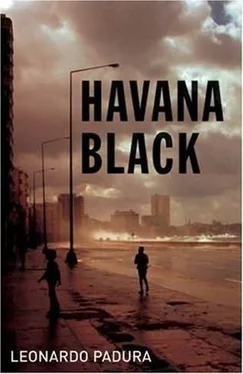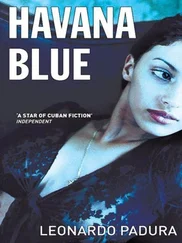Leonardo Padura - Havana Black
Здесь есть возможность читать онлайн «Leonardo Padura - Havana Black» весь текст электронной книги совершенно бесплатно (целиком полную версию без сокращений). В некоторых случаях можно слушать аудио, скачать через торрент в формате fb2 и присутствует краткое содержание. Жанр: Триллер, на английском языке. Описание произведения, (предисловие) а так же отзывы посетителей доступны на портале библиотеки ЛибКат.
- Название:Havana Black
- Автор:
- Жанр:
- Год:неизвестен
- ISBN:нет данных
- Рейтинг книги:3 / 5. Голосов: 1
-
Избранное:Добавить в избранное
- Отзывы:
-
Ваша оценка:
- 60
- 1
- 2
- 3
- 4
- 5
Havana Black: краткое содержание, описание и аннотация
Предлагаем к чтению аннотацию, описание, краткое содержание или предисловие (зависит от того, что написал сам автор книги «Havana Black»). Если вы не нашли необходимую информацию о книге — напишите в комментариях, мы постараемся отыскать её.
The novel evokes the disillusion of a generation, many of them veterans of the war in Angola, discovering the corruption of those who preceded them. Yet it is a eulogy of Cuba, its life of music, sex and the great friendships of the people who elected to stay and fight for survival.
Havana Black — читать онлайн бесплатно полную книгу (весь текст) целиком
Ниже представлен текст книги, разбитый по страницам. Система сохранения места последней прочитанной страницы, позволяет с удобством читать онлайн бесплатно книгу «Havana Black», без необходимости каждый раз заново искать на чём Вы остановились. Поставьте закладку, и сможете в любой момент перейти на страницу, на которой закончили чтение.
Интервал:
Закладка:
“We’ve come to search your house,” he finally replied, and Adrian Riverón’s smile withered at the policeman’s words.
“And what’s it all about?”
“According to Fermín Bodes you were preparing a clandestine departure from the country. We want to see whether you’ve begun your shopping. Look, here’s the search warrant. And two neighbours are coming as witnesses.”
“But this is madness…”
“No, it’s just a hunch,” retorted the Count, and he pointed Adrian Riverón to one of his own armchairs. “Manolo, you talk to him and see if he has anything useful to say,” added the lieutenant and, when the neighbours came, he explained the reasons for the search and went into the house followed by Crespo and el Greco.
“What are we looking for, Conde?” El Greco seemed confused and the lieutenant stopped in his tracks. He looked at the policeman, remained silent for a few seconds, then responded: “Whatever, how do I know? Something useful for making a secret departure, but above all a sign that Miguel Forcade was here the day he was killed.”
“But what might that be, Conde?”
“I told you, whatever, for fuck’s sake. Let’s just take a look and forget everything else. Use your heads… Oh, and see if you can find a box of cigars.”
While his helpers searched the garage, the Count started on Riverón’s bedroom. He looked in the wardrobe, under the bed, and reviewed a few books of socialist economics somnolently gathering dust on a small bookcase, as abandoned as the planned ideal they had proposed for their real, near, dialectically historical future. Then he opened the chest of drawers: Adrián Riverón was an organized man despite his prolonged bachelordom, and the Count envied a quality he had never possessed. Pullovers, underpants and handkerchiefs were clean and neatly folded, and his socks were inside each other, like small soft balls. Towels and sheets were also clean and neatly folded, looked almost ironed, and the envious policeman greeted them with a look of displeasure, noticing a slight shininess at the bottom of the second drawer. He lifted the linen up and took out two disturbing and conflicting photographs: the bigger one was a black and white enlargement of a young couple at what must have been a coming-of-age birthday party: she, wearing a long, lacy, light-coloured dress, already stared with the provocative eyes that had stirred the Count’s fear and desire. By Miriam’s side – green fruit, but already edible at fifteen – smiled her dancing partner, a pitifully thin Adrian Riverón, hair combed over forehead and growing down under his ears, stuffed into the worst cut, even worse worn suit Mario Conde had ever clapped eyes on. Everything was ingenuous, youthful, distant and even slightly squalid in that photo of lost innocence. But the other snapshot was raucous and risqué: there, in full-colour, on card three by two, was a naked Miriam, looking slightly surprised at the camera she’d perhaps set up herself. The woman lay there, lifting her arms over her head to secure a more provocative pose and project her breasts more pointedly, breasts crowned by nipples that exceeded the Count’s wildest imaginings. At the same time, her legs were slightly parted to reveal to the eyes of the recipient the dramatic darkness of her sex. I knew it, thought the Count, this fucking piece isn’t blonde, and he turned over the card and read: TILL I’M YOURS AGAIN IN FLESH AND BLOOD. YOUR MIRIAM, and at the bottom a date: 12 – 7 – 84. He couldn’t avoid taking another look at the woman who had undressed for the photo and thought it was a pity he hadn’t had better opportunities with her: she was food for the gods without a doubt, as the progressive hardening he felt between his legs told him, forcing him to turn the photos over and leave them on the bed, feeling he’d peeped through a keyhole at an act of rapturous love meant for someone else.
“Nothing in the garage, Conde,” announced Crespo, and got the reply, “One of you go to the kitchen and the other to the bathroom.”
He went out in search of the back door, and, when he saw Adrian, he commented: “A pretty set of photos,” and carried on to the patio, imagining what the fellow must be thinking.
There was a covered terrace at the back of the house, with a clothes sink, and a small cupboard for cleaning tools. The rest of the patio had been covered in cement, except for two circles of earth where clumps of seemingly ancient mangos were growing. There was a small shed against the back wall separating Adrian’s patio from his neighbours’ that the Count supposed must be ideal for storing tools and things for use in the house. An open padlock, hanging from a ring, alerted him to the possibility that something of value might be kept there and the policeman took a deep breath before going in. There he saw shelves as well organized as the bedroom drawers, with boxes for nails, clips, parts for the plumbing and electricity: what you’d expect in a place like that. In one corner he found two gloves and a baseball helmet. So he was a baseball player as well, he thought and couldn’t stop himself picking up one of the gloves, putting it on his hand and hitting it against the other, as if he were anticipating some really big hits. Feeling nostalgia aroused by memories of his happy days as a street baseball player, the lieutenant put the glove back in its place and crouched down to see what was in some jute bags, when the two policeman came up behind him.
“Zilch, zilch to filch: not even a cigar,” quipped el Greco and the Count turned round to look at him from where he was crouching.
“So, you’ll be filching zilch, as usual. Well, it seems there’s no lead here. The bags contain stuffing for cushions,” he confessed, standing up, feeling the threat of defeat deal a blow to his knees.
After all it didn’t make much sense for anything to turn up there linking Miguel and his death to Adrian Riverón – beyond the links to be drawn from those nostalgia-provoking photos, real desire and hatred, and the gloves, which betrayed a dangerous liking for baseball shared with millions of Cubans – so his painful hunch would have to contain itself till it found richer pastures. But which ones? He couldn’t see any offering themselves and quaked at the idea of having to shut himself up with Miriam – now he knew her better and could testify to her state as an apocryphal, almost pornographic blonde – or with Fermín and Gómez de la Peña to find some light at the end of the tunnel, he thought, as he abandoned that small room and grabbed the door in order to shut it behind him.
“Wait a minute, Conde,” said el Greco, who took one look in the room and then stared at his boss: “What was the instrument the forensic said the dead man was beaten with?”
The Count looked at him and the pain from his hunch vanished as if by magic, for the words spoken by that lad were like the wave of a wand and he would put him forward as the Most Intelligent Policeman of the Month, so that the Union would place him on its wall display for labour rewards and bear him in mind for the next handout of electrical goods: yes, he deserved a freezer and a week on the beach that genius of a policeman who made him yell: “Fucking hell, Greco, have you seen the bat?”
“Well, I can see a bat, Lieutenant: look up there,” replied the policeman and the Count looked up: between roof-tiles and iron beams there lay a wooden bat, crouching as conclusive as death itself.
The last time Mario Conde had played baseball was at university. He was in the third year of his degree and, as usual, volunteered to be part of the worst baseball team in the whole history of Cuban university sport. It was as if the central-European scientific model for the planning of economic and social life proposed by Gómez de la Peña had also penetrated the hidden recesses of the student body, and it was considered necessary, one fine day, to restructure – yet again – the country’s universities and their faculties. That’s why one morning the School of Psychology, which had always been part of the science faculty, was transformed, through some mysterious administrative design, into an independent faculty, as rigorous as all the other university faculties. Then, in order to meet all the necessary norms and obligations, the faculty had to participate in the University Games with its own teams, in which inevitably the names of the same athletes cropped up again and again because of the lack of students matriculated in that new faculty, more renowned for its intellectual activities than its crude physical aptitudes. And that last year when the Count played baseball he also kept goal for the football eleven, defended for the basketball team, ran for the 4×400 relay team, as well as playing first base and third bat in the baseball team… The Count as third bat…! Because the Psychologists’ only sporting virtue was their enthusiasm: although they were doomed to come last in almost all competitions, they were proud to hold aloft the Olympic motto that competing was more important than winning – for they almost never won; among other reasons because of the exhaustion their sportsmen accumulated over a week of non-stop action.
Читать дальшеИнтервал:
Закладка:
Похожие книги на «Havana Black»
Представляем Вашему вниманию похожие книги на «Havana Black» списком для выбора. Мы отобрали схожую по названию и смыслу литературу в надежде предоставить читателям больше вариантов отыскать новые, интересные, ещё непрочитанные произведения.
Обсуждение, отзывы о книге «Havana Black» и просто собственные мнения читателей. Оставьте ваши комментарии, напишите, что Вы думаете о произведении, его смысле или главных героях. Укажите что конкретно понравилось, а что нет, и почему Вы так считаете.











